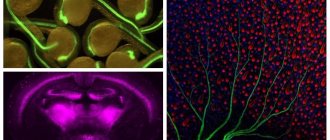Alexey Khmelev
Eating disorders and food addiction
Differences with eating disorders
First of all, it is necessary to distinguish between two concepts: “food dependence (addiction)” and “eating disorders.” The latter include anorexia nervosa and bulimia, which have a different etiology from food addiction. For these are other psychopathological phenomena than food addiction.
The basis of anorexia nervosa
most often lie dysmorphophobic experiences, which are characterized by dissatisfaction with one’s own figure and appearance in general, and overweight in particular. According to a person suffering from anorexia nervosa, his external imperfection is so obvious that it “cuts the gaze” of those around him, who try to clearly point out his ugliness and disgust. Therefore, it is necessary to get rid of excess weight, most often through voluntary fasting.
In one case, the ultimate goal of fasting is to lose weight on your own in any way, including the most bizarre options. One of the dominant psychological motives in this case is the desire for physical changes. An indomitable desire to look your best, so that everyone gasps with delight and envy at the same time. Moreover, the definition of this very “better”, the standard to which one must strive, lives exclusively in the head of the person himself.
In another version, the defining and most significant trigger is the desire to independently set a difficult task and experience a feeling of deep satisfaction and pride from its implementation. In the process of such fasting, gradually, signs of physical exhaustion begin to appear more and more noticeably, and it becomes more and more difficult to control what is happening. Any attempts on the part of relatives and friends to influence the situation are doomed to failure. People suffering from anorexia live in their own reality, understandable only to them. The aversion to food becomes so strong that even chewing gum or toothpaste in the mouth is perceived by them as quite a sufficient amount of food.
Bulimia nervosa
– another extremely dangerous eating disorder. The main feature of bulimia is systematically repeated attacks of uncontrolled consumption of excessive amounts of food in a short period of time (about two hours), followed by cleansing the body in various ways, against the backdrop of a difficult feeling of shame and remorse for what has been done.
Most often, cleansing the body is done through self-induced vomiting, or taking large amounts of laxatives and diuretics, or using enemas. Another option for burning calories is extremely intense physical activity, often leading to injury, or exhausting diets. This behavior overlaps with the behavior of individuals suffering from anorexia, and often both disorders coexist.
Causes
To this day, the reasons that can cause bulimia have not been clearly established, but research shows that there are certain factors that contribute to its development. They include certain personality traits (proneness to depression and low self-esteem). As well as an unfavorable family history (bulimics often come from dysfunctional families in which rules are chaotic or non-existent, alcohol or substance abuse is common, and too much emphasis is placed on appearance).
Many bulimic patients say that they were deprived of parental affection as children. And one of the psychological causes of bouts of gluttony may be physical attempts to satisfy emotional hunger. Get rid of feelings of loneliness and feelings of inferiority. Often the inability to control eating behavior is a manifestation of a lack of control in other areas of life. Which is expressed in alcohol abuse, spending money or compulsive theft.
The mortality rate for eating disorders, including anorexia, can be as high as 20 percent, including deaths from heart and intestinal injuries and suicide.
The consequences of bulimia are extremely severe. In addition to a general decrease in vitality, these are diseases of the esophagus and damage to tooth enamel (from vomiting). Violation of water and electrolyte balance due to the use of potent diuretics leads to heart and kidney diseases. In rare cases, a binge eating episode can cause a rupture of the stomach or esophagus. Which in turn can cause internal bleeding. Overuse of laxatives can cause problems in the digestive system and intestines.
In addition, bulimia can manifest itself as a psychopathological symptom in various mental disorders. Organic diseases of the brain, mental retardation, schizophrenia, etc.
Food addiction, definition:
The key difference between food addiction and eating disorders is that it, as well as the formation of any addiction in general, is based on the principle of positive emotional reinforcement (conditioning), when as a result of one’s activity (in this case, overeating or starvation), a person experiences physical pleasure and a surge of positive emotions.
An addict suffering from food addiction cannot independently stop systematically overeating, even despite the negative consequences of this behavior that are obvious to him and those around him.
One can argue for a long time whether food addictions are true addictions or not, but the mechanism of formation and symptoms in both cases are practically the same, and it is difficult to deny this. A number of studies have shown that foods high in sugar, salt, fat, refined carbohydrates and sweeteners can be addictive, in the same way as alcohol - by stimulating the pleasure centers of the brain and triggering the release of “happy hormones” (dopamine, serotonin, endorphins, etc.), causing a strong feeling of pleasure and satisfaction.
Food addicts tend to eat quickly and feverishly, overeating to the point of physical discomfort. In some cases, instead of one-time overeating, systematic “snacks” take place throughout the day, but the total amount of food consumed also significantly exceeds the daily norm necessary for the normal functioning of the body. Food addiction can lead to obesity, but not everyone who is overweight or obese also suffers from food addiction.
Just like any other addiction, food addiction can trigger cravings, build tolerance, and cause withdrawal symptoms. For example, studies using high-tech brain scanning techniques that compared the reactions of a healthy person and a food addict to seeing a milkshake showed that the addict's reaction was exactly the same as the reaction of an alcoholic who was shown a steamy glass of vodka.
Who can become addicted to food
People systematically overeat and become obese for many reasons. Those who occasionally drink alcohol because they like its taste and effects are not yet alcoholics, just as people who occasionally smoke marijuana are not yet drug addicts. Recent studies have attempted to determine what distinguishes a food addict from someone who overeats. These differences are important because they directly relate to approaches to treating food addiction.
For example, when addiction is the main cause of obesity, traditional treatment consisting of diet, where willpower and personal responsibility of the individual are of great importance, will be completely ineffective. Since food stimulates the pleasure center of the brain, many experts rightly believe that the same approaches and methods should be applied in this case as in the treatment of any other addiction. A simple change in lifestyle and diet, or even gastric bypass, will have minimal effect, since the cause of obesity is food addiction.
Food addiction: signs and symptoms
First of all, these are symptoms characteristic of any type of addiction, and it is their presence that distinguishes true food addiction from episodic overeating and ordinary intemperance in nutrition. Most food addicts answer with a resounding “yes” to all of the points below.
- Tolerance. A person needs to constantly increase the amount of food consumed to achieve the desired psychological effect or sensation.
- Cancel. When the required food or its quantity is not available, physiological and/or psychological withdrawal symptoms (stress, anger, depression) occur. A person tries to get what he wants in any way, regardless of the consequences, in order to relieve withdrawal symptoms or alleviate them.
- Unplanned, spontaneous abuse. The person consumes more food, or takes it over a longer period of time, than originally intended.
- Persistent attempts to solve the problem on their own fail, despite understanding the gravity of the situation.
- Obsession with food. A lot of time is spent on preparing food and on rituals associated with its consumption.
- Reducing or completely abandoning social, professional or recreational activities, and devoting the freed time to activities related to food in one way or another.
- Food abuse continues despite persistent or recurrent physical and/or psychological problems associated with it and constantly getting worse.
- After incidents of overeating, a feeling of guilt or remorse for what they have done arises; promises are made to oneself and loved ones not to repeat this in the future.
- Eating food even in the complete absence of hunger, or using it to lift your mood, eliminate symptoms of depression, irritability, or depression.
Most people suffering from food addiction do not realize this, and general practitioners sometimes do not have sufficient special knowledge to recognize this problem in a patient. As a result, a person can unsuccessfully fight obesity for many years under the guidance of nutritionists, trying to get rid of the symptoms, instead of eliminating their cause - food addiction. During this treatment, many continue to overeat to avoid the psychological discomfort caused by various diets that lead to withdrawal symptoms. Often a person tries to eat “just a little bit of what he shouldn’t,” but the problem is that even a small amount can trigger uncontrollable overeating.
Causes of food addiction
Like any addiction, food addiction has many causes, and it is impossible to single out just one, the main one.
Emotions and stress
People who become addicted to food may eat to increase positive and decrease negative emotions. For example, you might eat pizza to “reward yourself” for an accomplishment. But you can also eat pizza because something bad happened to you and you suffered mentally, which means you need to feel sorry for yourself. This is a classic dependence formation scheme.
Brain Chemistry
Foods rich in fat and sugar can have a stimulating effect on the reward centers of the brain in much the same way as drugs and alcohol. Experiments conducted on rats showed that animals trained to self-inject heroin and cocaine using the appropriate lever stopped using it if they were offered natural sugar. Thus, it was found that rats prefer the pleasure of consuming “natural” sugar to the high of drugs. This study shows that sugar may indeed affect the brain's reward system even more than these drugs.
Genetics
Another reason for a person to develop food addiction may be a genetic predisposition to it. A 2002 study found that women who grew up in households where an adult drank alcohol heavily were 49% more likely to be obese compared to others. Although not everyone who is obese also suffers from food addiction. Nevertheless, this fact suggests that there may be a positive correlation between alcohol dependence of parents or relatives in childhood and the development of food addiction in adulthood.
Psychological trauma
Research has shown that among women with the most symptoms of post-traumatic stress disorder (PTSD), the prevalence of food addiction is more than twice the average. The earlier the trauma was suffered, the greater the likelihood of developing an addiction. This suggests that women who experienced a serious traumatic situation in childhood are much more likely to develop food addiction compared to others.
Consequences of food addiction
Over time, food addiction can cause serious physical and psychological problems. People who suffer from food addiction for a long time gradually learn to hide their problem from loved ones. They begin to hide food and eat at night, while simultaneously suffering from depression and decreased self-esteem. This is made worse by the fact that most do not even realize that they are addicted to food, but simply consider themselves weak-willed and undisciplined.
Among the most quickly manifested negative physical consequences of food addiction are: upset stomach, heartburn, severe nausea, and vomiting. All this is familiar to those who have seriously overeated at least once in their lives. But there are also psychological consequences that are noted by many food addicts. People describe these feelings as intense emotional distress, using words such as “ashamed,” “guilty,” and “disgusted.” Trying to get rid of these negative experiences can cause people to eat even more.
The most important and severe long-term consequence of food addiction is obesity. With constant overeating and eating foods rich in sugar, weight gain is inevitable. For many people (especially women, who are most susceptible to food addiction for a variety of reasons), awareness of their own unattractiveness and physical imperfection becomes a real tragedy and mental suffering.
Depression and food addiction
Research shows that there is a strong link between food addiction and negative emotional states, including depression and anxiety. Adults with food addiction have a higher prevalence of major depression, bipolar disorder, anxiety disorders, and substance abuse than those without food addiction. Obese people also have higher rates of depression. But the most alarming factor is the link between suicidal ideation and binge eating. More than half of patients with food addiction and those suffering from bouts of gluttony have thought about suicide at least once. This suggests that episodes of uncontrolled overeating lead to severe emotional distress.
In addition to psychological consequences, very common companions of obesity and food addiction are type 2 diabetes, high cholesterol, coronary heart disease, high blood pressure, sleep apnea, depression, arthrosis, reproductive problems, gallstones, and stroke. If food addiction is not treated, it will inevitably progress over time.
Treatment of food addiction
Unfortunately, there is no easy solution to addiction recovery. There is no cure, no magic spell, no magic wand. If for some it is enough to simply learn to control the consumption of certain foods, then for others it will be necessary to completely abandon them, forever, for the rest of their lives. It won't work any other way. If you suspect you have a food addiction, the best solution is to seek professional help.
There is an opinion that getting rid of food addiction is even more difficult than, for example, alcohol addiction. After all, an alcoholic can eliminate alcoholic beverages from his diet. Thus, you protect yourself from a possible relapse, and a food addict is not able to completely abstain from eating. This means that they will always be at risk of relapse.
Comprehensive food addiction treatment typically combines behavioral therapy, nutritional counseling with a dietitian, changes in eating habits, and social support. If food addiction is the result of an emotional disorder such as anxiety or depression, then in this case it is necessary to get rid of the causes first, where psychological help can at least mitigate the negative cravings for food.
If you suffer from food addiction and want to break the vicious cycle of compulsive overeating, then I would be happy to help you!
- 104
- 2
Reasons for the development of food addictions
There are several reasons for gaining excess weight:
1. Biological is everything that has to do with the physiology of your body. For example, weight gain can be influenced by childbirth, heredity, a sedentary lifestyle, and surgery, but in the context of eating disorders, weight gain is a consequence of dieting, severe restrictions, and fasting.
2. Psychological – this is everything that is connected with your psyche. For example, psychological trauma, experiences rooted in childhood and germinating into reality. This can be stress, a feeling of boredom, resentment, loneliness, a feeling of rejection by society or some kind of inconsistency with society, experiencing various remorse or the most destructive feelings - shame and guilt. Most often, it is because of these feelings that people begin to gain weight and begin to replace normal eating habits with unhealthy ones.
3. Social – this is everything that is connected with the society that surrounds you, your immediate environment (family, loved ones). The family is an integral system; it plays a very important role in the formation of personality. It is in the family that we learn certain ways of behaving, thinking and feeling, with which we then go out into society.
If in childhood there were quarrels, injuries received in the family, rejection of emotions, then the child will react to all this in a way that will help him defend himself and adapt; these could also be incorrect eating habits or some other forms of addiction (alcohol, drug addiction, shopaholism, etc.) All this can further affect how a person behaves in society: whether he has friends, how he presents himself, etc.
4. Spiritual – the most complex reason arising from all of the above.
Depending on how the body, the psyche is structured and in what society a person is located, he will choose a certain philosophy, religion and other spiritual levels, on which his eating habits also depend. This means that every culture has its own traditions, including food preferences, with which a person either has to fight or get along.









